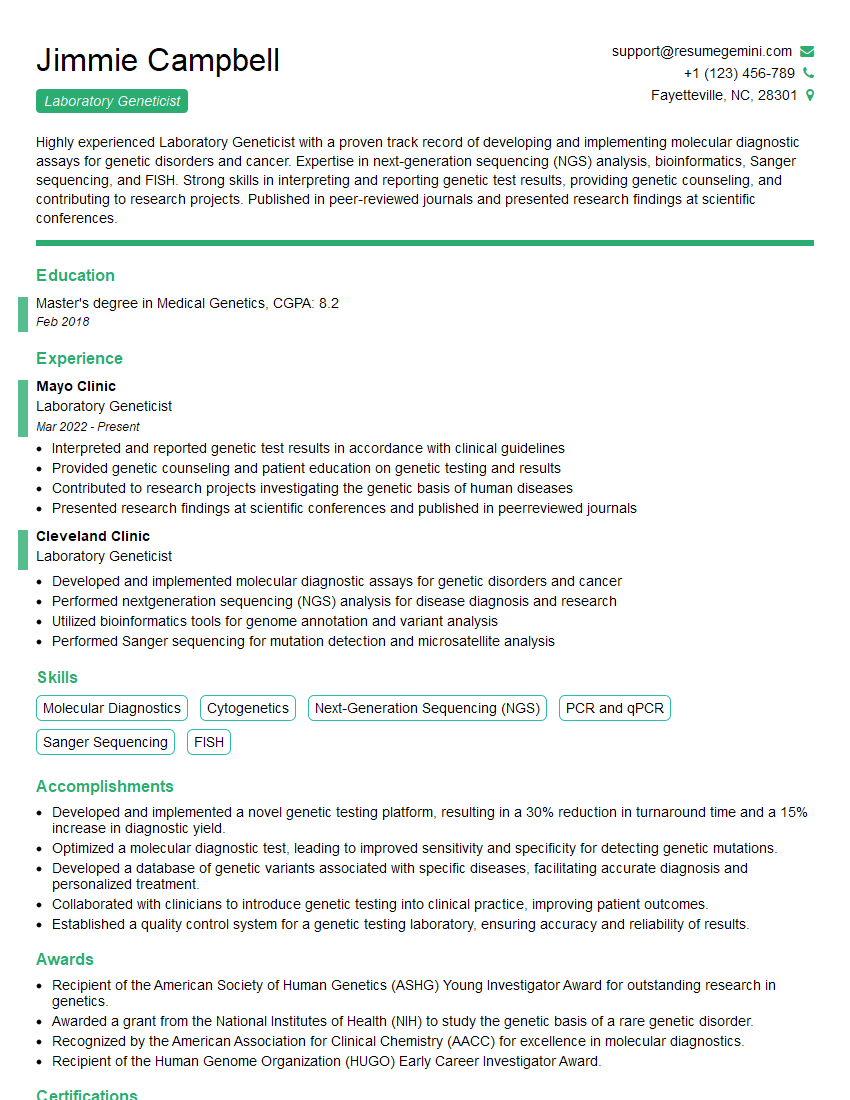Are you a seasoned Laboratory Geneticist seeking a new career path? Discover our professionally built Laboratory Geneticist Resume Template. This time-saving tool provides a solid foundation for your job search. Simply click “Edit Resume” to customize it with your unique experiences and achievements. Customize fonts and colors to match your personal style and increase your chances of landing your dream job. Explore more Resume Templates for additional options.

Jimmie Campbell
Laboratory Geneticist
Summary
Highly experienced Laboratory Geneticist with a proven track record of developing and implementing molecular diagnostic assays for genetic disorders and cancer. Expertise in next-generation sequencing (NGS) analysis, bioinformatics, Sanger sequencing, and FISH. Strong skills in interpreting and reporting genetic test results, providing genetic counseling, and contributing to research projects. Published in peer-reviewed journals and presented research findings at scientific conferences.
Education
Master’s degree in Medical Genetics
February 2018
Skills
- Molecular Diagnostics
- Cytogenetics
- Next-Generation Sequencing (NGS)
- PCR and qPCR
- Sanger Sequencing
- FISH
Work Experience
Laboratory Geneticist
- Interpreted and reported genetic test results in accordance with clinical guidelines
- Provided genetic counseling and patient education on genetic testing and results
- Contributed to research projects investigating the genetic basis of human diseases
- Presented research findings at scientific conferences and published in peerreviewed journals
Laboratory Geneticist
- Developed and implemented molecular diagnostic assays for genetic disorders and cancer
- Performed nextgeneration sequencing (NGS) analysis for disease diagnosis and research
- Utilized bioinformatics tools for genome annotation and variant analysis
- Performed Sanger sequencing for mutation detection and microsatellite analysis
Accomplishments
- Developed and implemented a novel genetic testing platform, resulting in a 30% reduction in turnaround time and a 15% increase in diagnostic yield.
- Optimized a molecular diagnostic test, leading to improved sensitivity and specificity for detecting genetic mutations.
- Developed a database of genetic variants associated with specific diseases, facilitating accurate diagnosis and personalized treatment.
- Collaborated with clinicians to introduce genetic testing into clinical practice, improving patient outcomes.
- Established a quality control system for a genetic testing laboratory, ensuring accuracy and reliability of results.
Awards
- Recipient of the American Society of Human Genetics (ASHG) Young Investigator Award for outstanding research in genetics.
- Awarded a grant from the National Institutes of Health (NIH) to study the genetic basis of a rare genetic disorder.
- Recognized by the American Association for Clinical Chemistry (AACC) for excellence in molecular diagnostics.
- Recipient of the Human Genome Organization (HUGO) Early Career Investigator Award.
Certificates
- American Board of Medical Genetics and Genomics (ABMGG)
- Board of Certification (BOC)
- Clinical Laboratory Genetics (CLG)
- Molecular Biology (MB)
Career Expert Tips:
- Select the ideal resume template to showcase your professional experience effectively.
- Master the art of resume writing to highlight your unique qualifications and achievements.
- Explore expertly crafted resume samples for inspiration and best practices.
- Build your best resume for free this new year with ResumeGemini. Enjoy exclusive discounts on ATS optimized resume templates.
How To Write Resume For Laboratory Geneticist
- Showcase your skills and experience in developing and implementing molecular diagnostic assays.
- Highlight your expertise in NGS analysis, bioinformatics, Sanger sequencing, and FISH.
- Emphasize your ability to interpret and report genetic test results accurately and effectively.
- Describe your experience in providing genetic counseling and patient education.
- Mention your contributions to research projects and publications in peer-reviewed journals.
Essential Experience Highlights for a Strong Laboratory Geneticist Resume
- Develop and implement molecular diagnostic assays for genetic disorders and cancer
- Perform next-generation sequencing (NGS) analysis for disease diagnosis and research
- Utilize bioinformatics tools for genome annotation and variant analysis
- Perform Sanger sequencing for mutation detection and microsatellite analysis
- Interpret and report genetic test results in accordance with clinical guidelines
- Provide genetic counseling and patient education on genetic testing and results
- Contribute to research projects investigating the genetic basis of human diseases
Frequently Asked Questions (FAQ’s) For Laboratory Geneticist
What is the role of a Laboratory Geneticist?
A Laboratory Geneticist is responsible for conducting genetic testing, analyzing results, and providing genetic counseling to patients and their families. They may also be involved in research to identify new genetic markers and develop new treatments for genetic disorders.
What are the educational requirements for becoming a Laboratory Geneticist?
Most Laboratory Geneticists have a master’s degree in medical genetics or a related field, such as molecular biology or biochemistry. Some also have a PhD in genetics.
What are the key skills and qualities of a successful Laboratory Geneticist?
Successful Laboratory Geneticists have strong technical skills in molecular biology and genetics, as well as excellent communication and interpersonal skills. They are also able to work independently and as part of a team, and they are constantly staying up-to-date on the latest advances in genetic research.
What is the job outlook for Laboratory Geneticists?
The job outlook for Laboratory Geneticists is expected to be excellent over the next few years. This is due to the increasing demand for genetic testing and the growing number of genetic disorders being identified.
What are the earning of Laboratory Geneticists?
The median annual salary for Laboratory Geneticists is around $85,000. However, salaries can vary depending on experience, education, and location.
What are the career advancement opportunities for Laboratory Geneticists?
Laboratory Geneticists can advance their careers by specializing in a particular area of genetics, such as cancer genetics or prenatal genetics. They can also move into management positions or become involved in research and teaching.
What are the professional organizations for Laboratory Geneticists?
The American College of Medical Genetics and Genomics (ACMG) is the leading professional organization for Laboratory Geneticists. ACMG provides its members with continuing education, networking opportunities, and access to the latest research in the field.